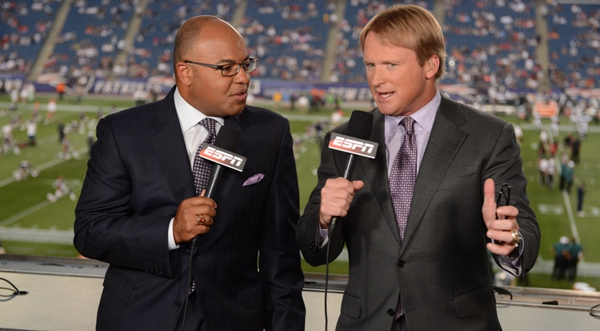In the past several years, many of this country’s biggest sporting events have moved to cable television. The Final Four, the BCS and now the College Football Playoff, much of the MLB and NBA postseason, and many others have migrated from over-the-air television to pay television.
The World Cup and Olympics have been huge rights deals for ESPN and NBCSN respectively. FS1 and NBCSN will see more NASCAR races come to cable in their next television contracts. The British Open and all four grand slam events in tennis are now solely televised by ESPN.
Nowadays it seems like only a few very exclusive sporting events remain on broadcast television.
Why the shift in recent years? For starters, cable and satellite television have become the standard. It seems like a lifetime ago that a major sporting event being televised on cable (gasp!) would be a big deal. Those days are long gone. Now with the advent of streaming devices, the focus is more on how we can watch games on our iPads or mobile devices, let alone through a cable box.
The money and viewership involved in these major sporting events are foundational to the entire cable television industry. Networks pay massive rights fees for these premier events, which in theory then causes the rising cable fees that go the other direction towards consumers. All because of the insatiable appetite from networks and fans alike for live sporting events. It’s no secret that ESPN’s exorbitant cable fees, five times higher than the next competitor, is one of the fundamental reasons for their dominance over the space.
It’s also one of the reasons why FS1 and NBCSN will always lag behind. Until they can demand higher cable fees with better live events, they’ll always be playing second fiddle to Bristol.
And this year, it’s the NFL’s turn to bring a playoff game to cable television. This Saturday, Panthers-Cardinals will air on ESPN as they will televise a Wild Card Playoff game for the first time.
And while the development may be met with a shrug of the shoulders from most sports fans in 2015, it’s still a significant development historically speaking.
The NFL Playoffs are the most lucrative property in all of television. The Super Bowl annually sets records for being the most watched show in the history of the medium with nine figure viewership numbers. The conference championship games draw massive audiences as well. In 2014, the least watched playoff game still drew 27.58 million viewers on NBC for Colts-Chiefs. Again, that was the least watched NFL playoff game.
With those kind of viewership numbers, at least having one playoff game might justify the billions of dollars ESPN is paying the NFL in their current contract for Monday Night Football.
The NFL’s arrival to cable may even set a record in its debut. The most-watched show in the history of cable television is the 2011 BCS National Championship Game between Auburn and Oregon. (Also on ESPN, naturally.) That game was watched by 27.3 million viewers. So if ESPN can match last year’s rating for the Saturday afternoon game, they will pass their own record set a few years ago.
However, ESPN drew the short straw this year. Their Wild Card debut may be one of the least attractive from a television standpoint in the history of the playoffs. On one side stands the 7-8-1 Carolina Panthers. On the other side are the 11-5 Arizona Cardinals with third string QB Ryan Lindley. Unbelivably, Carolina is actually favored to win the game. If only Arizona had Cardale Jones…
Nevertheless, even if the ratings go down for this playoff game, ESPN is still staring at one of cable’s biggest all-time audiences falling in their laps. You could send the expansion Tampa Bay Buccaneers against Matt Millen’s Lions, slap an NFL Playoffs logo on it, and still get an automatic 20 million viewers no matter the network.
ESPN’s first contract with the NFL in the 1980’s was one of the major turning points for the network on their way to becoming one of the world’s most successful television networks. The arrival of the NFL Playoffs some 25 years later might appear to be a formality, but in the history of ESPN and cable sports it might just be the final barrier that’s broken.








Comments are closed.